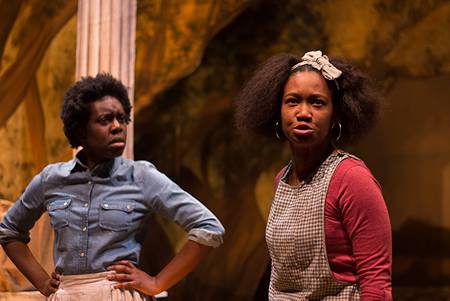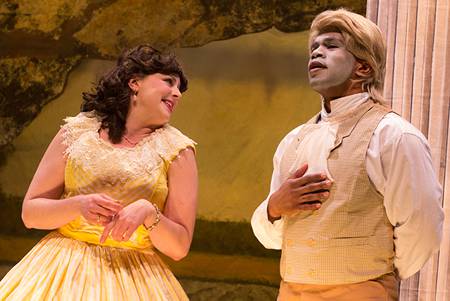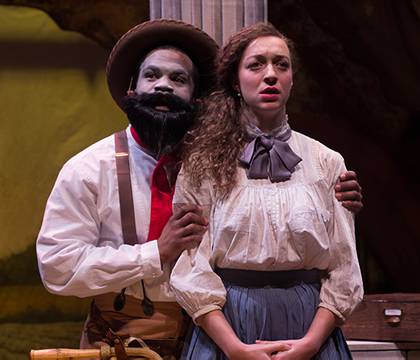Play (2014)
by Branden Jacobs-Jenkins
Directed by Summer L. Williams
Company One Theatre
in conjunction with
Arts Emerson
Paramount Center, Theater District, Boston
January 29 – February 27, 2016
With Brandon Green (BJJ, George, M’Closky), Brooks Reeves (Playwright, Wahnotee, LaFouche), Harsh Gagoomal (Assistant, Pete, Paul), Shawna M. James (Zoe), Bridgette Hayes (Dora) Elle Borders (Minnie), Obehi Janice (Dido), Amelia Lumpkin (Grace), Kadahj Bennett (Bre’er Rabbit, Ratts)

Elle Borders as Minnie
in “An Octoroon”
Photo: Paul Fox
Courtesy of Company One Theatre and
Arts Emerson
Encapsulated in the core of this interesting and entertaining play is an historical melodrama involving the manipulation of an inheritance of an estate. At issue – there are many of them in this quite involved plot – is the seeming lily-white, but actually eighth-part African-American, woman, Zoe (Shawna M. James), who, as an octoroon, is deemed ineligible for marriage to the landowner, George (Brandon Green), who loves her.
Based largely on The Octoroon by an Irish-born American playwright, Dion Boucicault, the actual hit of 1859 which opened in New York, the inner play provides a popular entertainment about the derailed inheritance and love match that was based on the novel The Quadroon by Thomas Mayne Reid (1856).

Brandon Green as George
in “An Octoroon”
Photo: Paul Fox
Courtesy of Company One Theatre and
Arts Emerson
In playwright Jacobs-Jenkins’ contextualized recasting, the play is mostly humorous, but interspersed, particularly at one point, with horrifying imagery, meant to put the farcical medlodrama in context. The stark imagery does serve that purpose indeed, but at the considerable expense of a jarring alteration of tone. That does certainly seem to be the intent of the production, and its point comes through quite potently.
Much like Jacobs-Jenkins’ Appropriate, performed at Speakeasy Stage this past fall, which views a family in Arkansas reviewing a house full of a deceased parent’s possessions, the real punch line is condensed, abbreviated and potent. In An Octoroon, the effect of that seemingly out of place, but jarring, imagery, provides an equivalently incisive shock, similarly condensed but potent.
Obehi Janice (Dido) and Elle Borders (Minnie) play a wild and very funny pair, real cut-ups and are very entertaining. Janice and Borders work beautifully together, making the most of Jacobs-Jenkins’ refigured and significantly updated trash talk, enabling one to see them, at once, as slaves and as contemporary commentators on slavery. Their energetic and lively schtick is one of the great highlights of this production.

Shawna M. James as Zoe
in “An Octoroon”
Photo: Paul Fox
Courtesy of Company One Theatre and
Arts Emerson
Brandon Green (George, M’Closky) makes up in white-face – in front of the audience, at the outset of the meta-play – to bring to life a couple of the characters in the embedded play, the plantation owner, George, and his rival M’Closkey. He conveys this pair of opposed characters, with alternating blond wig and dark beard, with a dry and witty disposition framing his broad representations of the melodramatic duo. As well, in the meta-play, Green plays BJJ, the black playwright who muses over the old embedded melodrama, subtly echoing the farcical blusteringss of the archival opponents with the more thoughtful and contemporary voice of the author’s proxy.
Other skin colors get mixed up in provocative ways.
Brooks Reeves, a white actor, puts on red paint to play the Native American Wahnotee. Harsh Gagoomal, a South Asian actor, dons blackface to play two slaves, Peter and Paul.
Apparently Jacobs-Jenkins had read the 1859 play while a college student and mused on it for a long time before embarking on his adaptation and contextualization of it, moved initially by a desire to see the original produced in some form. Clearly, his creative refiguring moved the original well beyond its initial boundaries, and the result is a play that both presents the original and reflects critically upon it at the same time.
In the end, it is the surreal effects of the applied skin tones and the hilariously comedic routines of Minnie and Zoe that make the greatest impression from the play within the play. And, of course, the horrific photographs that, in the meta-play, evoke the realities of racism in the antebellum South, infuse the production with a seriousness that penetrates well beyond the boundaries of the contextualized farce.
– BADMan
Leave a Reply